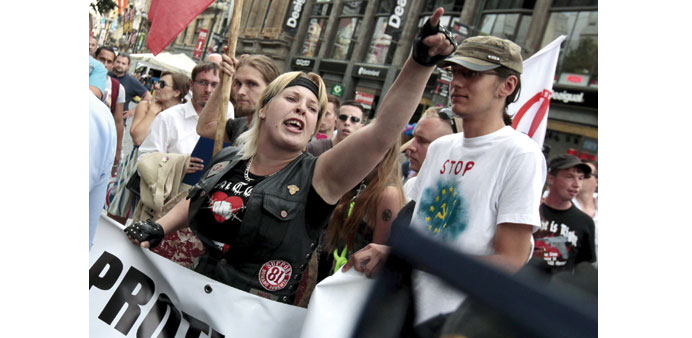Far-right activists shout slogans during an anti-immigrants rally yesterday to protest against a proposed mandatory migrant quota by the European Commission in Prague.
By Eva Krafczyk, DPA/Warsaw
Images of the violence in Syria and Iraq as well as immigrants arriving on EU shores after dangerous journeys across the Mediterranean don’t prompt much of a response from the eastern members of the European Union.
The governments in Warsaw, Vilnius, Riga and Prague are displaying a rare show of unity in rejecting quotas for refugees as the EU tries to redistribute the immigrants.
The EU wants to take pressure off Italy and Greece, where tens of thousands of immigrants have arrived by boat from North Africa and the Middle East this year.
Recent government declarations about the number of refugees they are willing to take in lag considerably behind the European Commission’s suggestions to relocate 40,000 people.
If the governments in Central and Eastern Europe and the Baltic region have their say, they will be taking in Christian refugees.
“After all, we are a country belonging to Christian culture,” Margus Tsahkna, the conservative minister of social affairs in Estonia, said recently.
In Slovakia, Prime Minister Robert Fico argued Christian arrivals were less likely to stir fears among the local population.
Terrorists might try to mingle among Muslim refugees, he added.
Slovakia is one of the countries with the lowest acceptance of asylum seekers.
Fourteen people were given formal refugee status in the past year after 331 applied to be recognised as refugees.
Far-right and nationalist groups have also demonstrated there in recent weeks “against the Islamisation of Europe”.
In the neighbouring Czech Republic, a group calling itself the Bloc Against Islam managed to collect 145,000 signatures on a petition against Muslim immigrants.
Czech President Milos Zeman has spoken out against taking in refugees from North African countries like Libya.
“Refugees from a completely different cultural background would not be in a good position in the Czech Republic,” he was quoted as saying by a spokesman.
Immigrants who are “culturally close” on the other hand, are Eastern European Slavs and Christians from Syria, according to the president.
The centre-left Czech government has agreed to accept 1,500 refugees after opposing the EU’s mandatory relocation scheme.
The government wants to be “in control of the whole process”, Prime Minister Bohuslav Sobotka said.
The new arrivals, therefore, have to pass security background checks and will have to live in off-limits centres, some of them in isolated areas like the foothills of the Beskid Mountains.
Poland, with a population more than three times larger than the Czech Republic, will probably receive about 2,000 refugees – but many Poles consider even this number too much.
In a poll published in the conservative Polish daily Rzeczpospolita on Monday, more than 70% of the respondents said they were against refugees from Africa or the Middle East coming to Poland.
In a similar poll held in Latvia, 55% spoke out against refugees in the Baltic country.
Even the preferred group of Christian refugees stirred a negative response among some.
Fifty Christian families from Syria who arrived in Poland at the weekend became part of the political fight as the country heads towards parliamentary elections in the autumn.
“We Poles, as well as the government, should act in solidarity towards our own compatriots beyond our national borders,” conservative politician Beata Szydlo said.
The challenger of Prime Minister Ewa Kopacz was referring to ethnic Poles in Kazakhstan who she said should be able to move to Poland.
As references to “culturally alien” refugees make the rounds in Eastern European societies, others are reminded of the not so distant past when Poles, Czechs and Lithuanians fled Communist regimes for the West.
“It is important that we Lithuanians do not lock our hearts,” said Gintaras Grusas, archbishop of Vilnius. “Our ancestors, our grandparents were refugees, too.”
In Poland, more than 60 non-governmental organisations have joined forces to remind the government and the public of the times when Poles received help from others and of the pride the country takes in its fight for freedom and democracy.
In an open letter published in June, they wrote: “If we are to call Poland ‘the cradle of Solidarity’, if we declare that we hold freedom and human rights dear, we should commit to providing assistance and support to those who cannot return to their home countries.”

